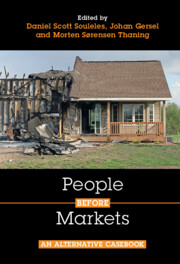Book contents
- People Before Markets
- People Before Markets
- Copyright page
- Dedication
- Contents
- Contents by Topic
- Authors
- 1 Introduction: Why Are You Here?
- 2 Some Philosophical Help with “Neoliberalism”
- Part I Our World
- Part II Our Lives
- 12 Why Do Some People Want to Manage Human Fertility?
- 13 How Should Childbirth Happen?
- 14 Who Is Responsible for Children’s Food?
- 15 How Should We Care for the Elderly?
- 16 How Are People Who Take Drugs Treated?
- 17 How Should We Design Access to a Healthcare System?
- Part III Our Work
- Index
- References
16 - How Are People Who Take Drugs Treated?
from Part II - Our Lives
Published online by Cambridge University Press: 27 October 2022
- People Before Markets
- People Before Markets
- Copyright page
- Dedication
- Contents
- Contents by Topic
- Authors
- 1 Introduction: Why Are You Here?
- 2 Some Philosophical Help with “Neoliberalism”
- Part I Our World
- Part II Our Lives
- 12 Why Do Some People Want to Manage Human Fertility?
- 13 How Should Childbirth Happen?
- 14 Who Is Responsible for Children’s Food?
- 15 How Should We Care for the Elderly?
- 16 How Are People Who Take Drugs Treated?
- 17 How Should We Design Access to a Healthcare System?
- Part III Our Work
- Index
- References
Summary
The war on drug users developed in tandem with neoliberalism. By examining the way that society polices and treat people who use drugs, Lenhard and Meng offer a perspective on how neoliberal governance individualizes responsibility and abstains from any kind of collective support. Lenhard and Meng make use of narratives drawn from their fieldwork to illustrate both what criminalized drug use looks like, and how people’s lives change when criminalization goes away. The chapter shows that it’s not necessarily the drugs that make people’s lives difficult and painful but rather the approach that is taken to their behavior. In one model of treatment – exemplified by the war on drugs and the use of methadone programs – a responsibility to change lies solely with the individual, and drug users are criminalized, surveilled, and disciplined primarily by law enforcement. Lenhard and Meng contrast this model with one where society is conceived as collectively responsible to provide support for whomever requires it (e.g., in the form of safe injection facilities) and addiction is understood as something to be managed both medically and holistically. What is interesting in the first model is the way that individual autonomy and responsibility is taken for granted as a preexisting, self-standing capacity that needs only to surveilled, incentivized, and disciplined from the side of the authorities. In the second model, on the contrary, autonomy and responsibility are conceived as capacities that needs to be nourished and cultivated within collective structures of trust and support.
Keywords
- Type
- Chapter
- Information
- People before MarketsAn Alternative Casebook, pp. 332 - 353Publisher: Cambridge University PressPrint publication year: 2022

